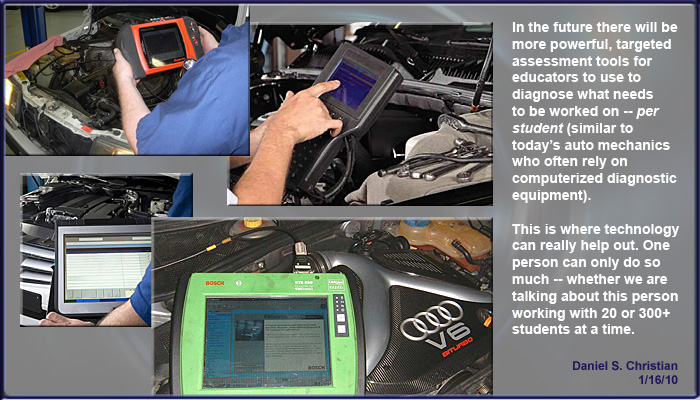From DSC:
In real estate, one hear’s the mantra:
Location. Location. Location.
In higher education, I have it that we’ll be hearing this for a while:
Experimentation. Experimentation. Experimentation.
Consider the following reflections on Steve’ Kolowich’s solid article, The new intelligence (from InsideHigherEd.com)
Excerpt:
And for the largest public university in the country, it is hardly fiction. Arizona State University has become ground zero for data-driven teaching in higher education. The university has rolled out an ambitious effort to turn its classrooms into laboratories for technology-abetted “adaptive learning” — a method that purports to give instructors real-time intelligence on how well each of their students is getting each concept.
.
From DSC:
Besides being used in blended learning environments…some predictions:
- These technologies will become integrated into what MOOCs eventually morph into and provide a significant piece of the assessment/guidance puzzle
- Such tools will be a part of one’s future learning ecosystem
- Such tools will be part of interactive, massively open online educationally-related games
- Such tools will be integrated into personalized learning agents — spiders/recommendation engines that scan the web for relevant items that one needs to complete one’s cognitive gaps in a subject/topic
- They will be accessible from your living room as well as from your mobile devices
- They will integrate into web-based learner profiles
It’s the sort of thing I was trying to get at with this graphic from 3 years ago:
.

Please don’t misunderstand me, the human mind is far beyond the complexity of an engine. But I still think that there will be more tools & technologies developed that will help the teachers/professors in their efforts to guide students into the knowledge of a discipline.
I beseech the corporate world to get involved more here — and not with the end goal of earning profits — but rather, with the aim of making the world a better place and giving a huge gift to the generations yet born.
I urge the corporate world to reach into their deep pockets (1.X trillion in cash at this point in time) and team up with our youth/teachers/professors/instructional designers/programmers/etc. to develop sophisticated, educationally-related, engaging games that are relevant to the world that our youth will be growing up in; and/or create interactive simulations that provide more choice/more control to the learners.
I urge more of the corporate world to join Knewton and Pearson and allocate some significant resources to help develop the next gen learning tools. I’ll bet that we’ll be amazed at what can be produced! Your daughters, sons, granddaughters, and grandsons will really appreciate the work that you did for them!!!











